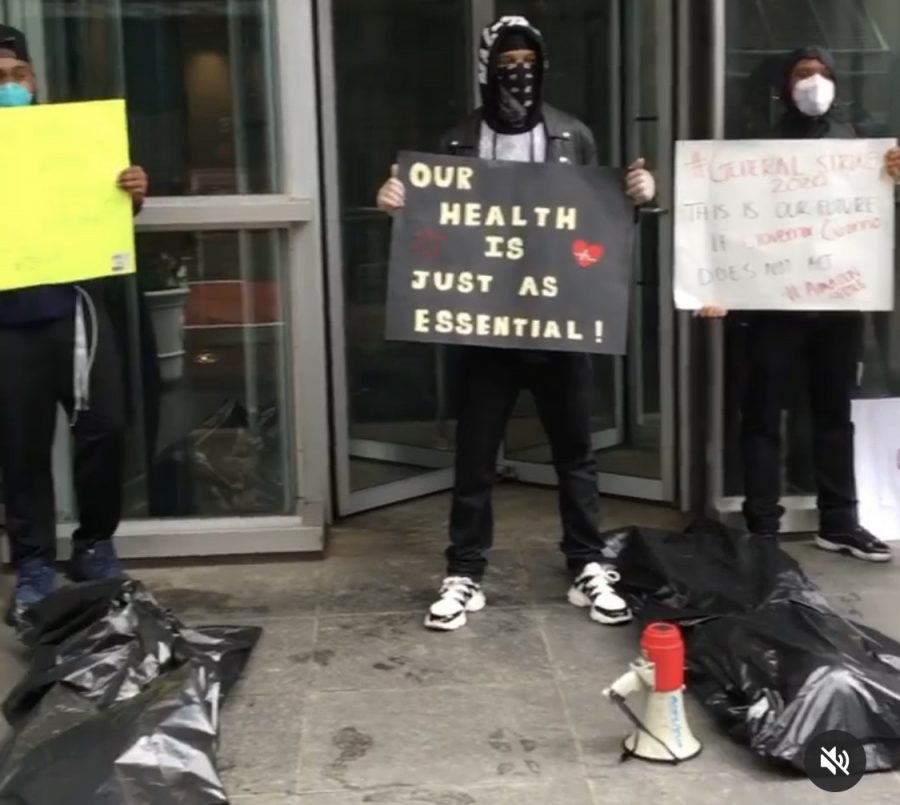Former Amazon supervisor protests working conditions and unprotected employees
May 1, 2020
Amazon has experienced tremendous growth these past few months despite the drop in the stock market on March 12. While on the outside it may seem Amazon is doing the best they can to help their community, an inside source unveiled his troubling perspective on the situation.
Chris Smalls, previously a supervisor, worked for Amazon in the JFK8 Amazon Fulfillment Center in Staten Island since 2015. He has recently come to the media to tell his story and the problems of which he feels the company has turned a blind eye.
At the beginning of March, the coronavirus reached the New York area, yet, Amazon proceeded with their regular agenda. According to Smalls, they had not changed any protocols in response to the vast spread of COVID-19.
“I had seen my employees begin to fall ill. Some of them were vomiting, had bloodshot eyes, some were fatigued and dizzy, and couldn’t finish their shifts.” Smalls said in an interview with Tower. He knew then there needed to be change. According to Smalls, no employees were protected and they did not have cleaning supplies and were not taking social distancing protocols.
It came to his attention, on March 24, that there had been a case of someone who had tested positive for COVID-19 on March 11 and had been working there for over a week with the virus. And still, even then, the company refused to shut down the building. Unable to practice social distancing in a place of over 5000 workers, Smalls explained that he started seeing a “domino effect.” At this point, he had been in close contact with the employee for over a week, but hadn’t been tested.
Every day the staff was forced to come to work, in need of money. Smalls said his employees are practically family and he needed to see that there was something being done to stop them from dropping like flies.
Smalls took a few days off and began to reach out to the CDC, The Health Department of Manhattan, the Mayor and the state government to get help for his crew. Smalls said when he came back, however, the company must have gotten word of his actions. They sent him home on the 28 of March, three weeks after his initial exposure.
“They didn’t quarantine the people I spend ten hours a day with, nor the person I drive to work with,” he said. “So that tells people right there that I had a target on my back and they only did that to silence me.”
On March 30 at 12:30 p.m., Smalls led an organized walkout of 50 workers to protest what had been happening.
“Word got around through notes passed, posters in the restrooms and by word of mouth,” he said. “It was like a spy mission, just trying not to get caught.”
He was terminated two hours later.
There has been recent news of a possible upcoming trial between Amazon and Chris’s Small’s story. The New York attorney general sent a letter to Amazon informing them he believes they may have violated New York State whistle-blower protections, by wrongfully terminating Smalls. These protections are intended to secure employees and allow them to speak/protest on problems that come up in their facility.
After the fact, Smalls turned into a media icon. He was interviewed in The Guardian, The Verge, New York Times, CNBC, ABC, and other news sources.
The company, since then, has offered employees able to leave their job and stay well for as long as they need only without pay. They also released a video showing employees’ social distancing in the workplace to reassure the public’s concerns but according to Smalls, it’s all fake.
Smalls said, “I am not upset that people still use Amazon. But it’s not only putting yourself at risk but the people who are forced to put themselves at risk. The buyer may think it’s just a few taps on the screen and a few days later they get their package but it goes through 6-7 people just for one box and you’re dealing with hundreds of thousands a day.”
Unfortunately, Smalls’s story is not the end of this crisis. In a CNBC news article, a spokesman who chose to hide his identity claims that, “Despite the instruction to stay home without pay, he came on site today, March 30, further putting his team at risk.”
In the same article, Employees from other offices reported that conditions were not safe where they work as well. When Tower staff attempted to contact JFK8 Center, management refused to speak to the media on the subject. It’s unclear what is true due to lack of sources but Smalls speaks confidently about Amazon’s poor treatment of their workers.
He said, “Amazon would rather fire workers than face up to its total failure to do what it should to keep us, our families, and our communities safe.”




